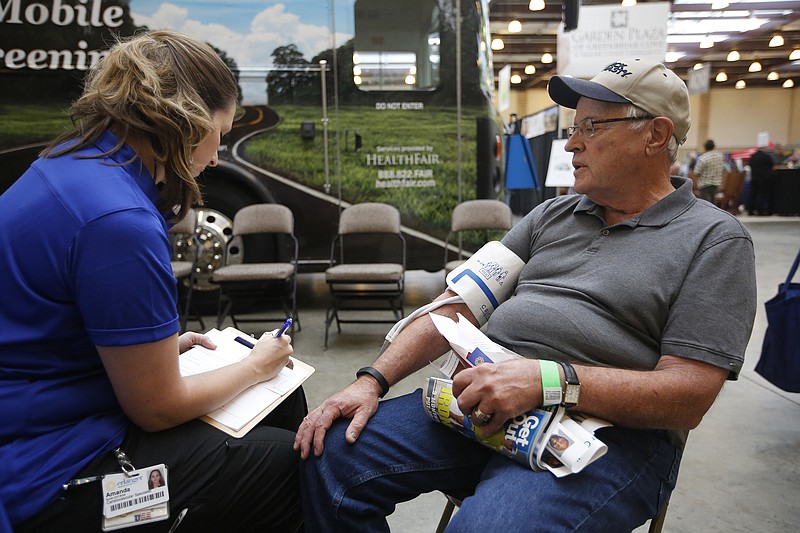Local heart doctors say an important new study recommending that patients reduce their blood pressure below previous guidelines could save thousand of lives. But several local cardiologists say the most important result of the study may be to convince more adults they have a blood pressure problem that needs treatment.
"High blood pressure doesn't make you feel bad, that's why we call it the silent killer," said Dr. Alison Bailey, director of preventive cardiology and cardiac rehabilitation services at Erlanger. "But it is the No. 1 risk factor for a lot of bad things - heart failure, stroke and coronary heart disease or heart attacks."
"I think the [study's] impact is huge in raising awareness," said Dr. Lisa Carkner, a senior cardiologist at the Chattanooga Heart Institute at CHI Memorial hospital. It will show patients that "controlling their levels to better levels can really impact their health, with mortality significantly lowered."
By the numbers
› Age 55 with high blood pressure: 50%› Age 75 with high blood pressure: 66%› Percent who know they have high blood pressure: 80%› Percent of those who keep it under control: 50%Source: Dr. Alison Bailey, Erlanger Hospital
More than half of all Americans over age 50 have high blood pressure, also known as hypertension, and two-thirds of those over age 75, Bailey said.
The study, which was published this week in the New England Journal of Medicine and announced at a meeting of the American Heart Association, involved nearly 10,000 people. Half were given normal blood pressure treatment to lower their systolic blood pressure levels to 140, the current recommended level, while the other half got more intensive treatment to lower their levels to 120. "Systolic" refers to pressure created in the arteries when the heart beats, and it is the top number in a blood pressure reading. The lower number, the "diastolic" reading, refers to pressure in the arteries between beats. The current recommended level for most adults is 140 over 80.
The study was supposed to run for six years, Bailey said, but after only three years, the results were so clear doctors ended it early. The group that received intensive treatment had about a third fewer heart attacks, strokes and heart failure and about 25 percent fewer deaths, she said.
Just as important, older patients did not show the bad side effects doctors had worried about.
"If you have an 80-year-old woman pushing 90 pounds who starts getting lightheaded because we get overzealous with her blood pressure control, she could have a fall," said Dr. Nathan Hartgrove, an internal medicine physician at Parkridge Medical Group Diagnostic Center.
Older test subjects experienced some side effects, but they were uncommon, so that group of people can also benefit from lower blood pressure, doctors said.
But the primary beneficiaries may be middle-aged adults, Hartgrove said.
"With a 40-year-old whose dad and grandpa had hypertension, this gives me more impetus to be more aggressive with him to get to that lower threshold," he said.
While the study's results are "very important," Bailey said, no one needs to rush to a doctor's office.
"High blood pressure affects us over years, not days or weeks or months," she said. "Our goal is better results five to 10 years from now for most folks."
But it is a topic that everyone with high blood pressure should bring up with their doctor at their next appointment.
"It basically starts a new discussion with my patients," Hartgrove said.
Some patients will need additional medication to lower their blood pressure to 120, but a better approach is to focus on overall lifestyle, Bailey said.
"We talk about, 'Do you want to be as healthy as you can be or as healthy as I can write you a prescription for?'" she said. "And those are very different things."
Most people need to eat a healthier diet, get more exercise and lose weight.
"The reason high blood pressure is so common is that our life has changed so much in the last 50 years," Bailey said. "Fifty years ago, our body mass index was lower, people were more active, and processed food didn't exist."
Reducing the amount of salt in food is also important.
"It's not the salt shaker on the table I'm talking about, but rather what we buy with salt in it," Bailey said. "Almost any food that comes in a bag, a box, or through a window is high in sodium."
But whether high blood pressure is treated by lifestyle changes or pills, the new study emphasizes the benefits of lowering it, Carkner said. "I'm hoping this increases awareness of the serious nature of hypertension."
Contact Steve Johnson at sjohnson@timesfreepress.com, 423-757-6673, on Twitter @stevejohnsonT-FP and on Facebook at stevejohnsonTFP.
